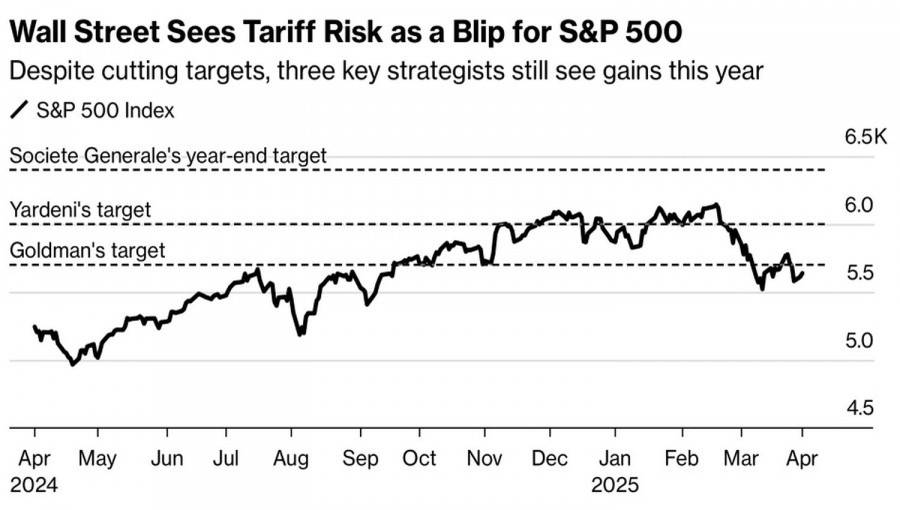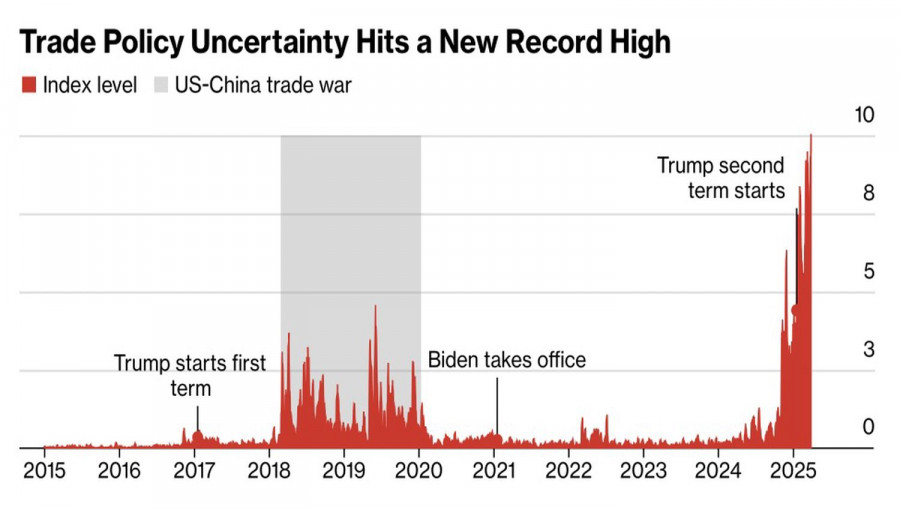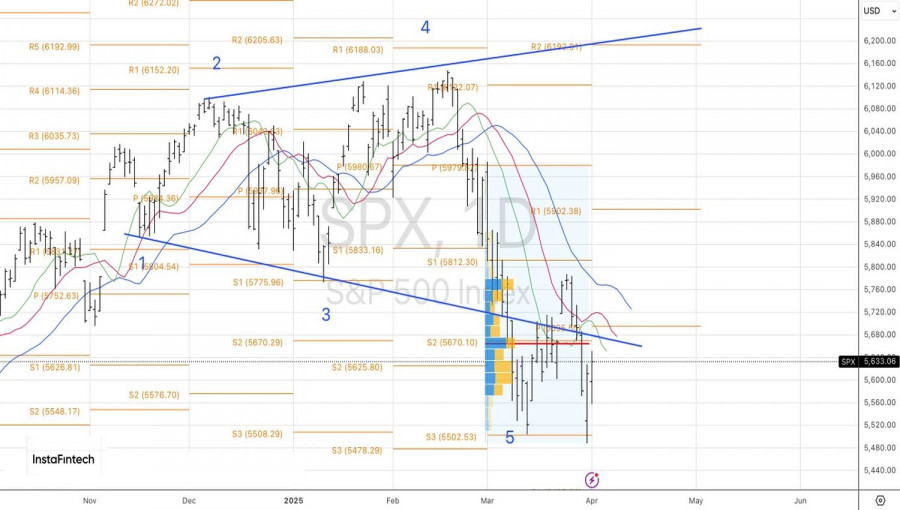Lihat juga


 02.04.2025 09:16 AM
02.04.2025 09:16 AMIt's too late to be afraid. Rumors are circulating in the market that the White House may implement a universal 20% levy instead of reciprocal tariffs—pushing the average import duty to its highest level since the 1930s and triggering a global economic shock. Yet, the S&P 500 remains surprisingly calm and resilient on the eve of America's "Liberation Day." Why? And how will the broad stock index react to the event of the year?
There are several explanations for the S&P 500's resilience. Investors are confident that Donald Trump won't go too far. He is unlikely to pursue a tariff policy so aggressive that it would threaten U.S. economic growth. Investors must see more signs of a cooling U.S. GDP to continue selling the broader index. Finally, greater clarity on import tariffs will reduce uncertainty, which is good for stocks.
It's no surprise that while major banks and firms are lowering their forecasts for the S&P 500, they still expect the index to rise by year-end. Yardeni Research now sees a target of 6000 by the end of 2025, down from 6400; Societe Generale forecasts 6400 instead of 6750; and Goldman Sachs lowered its outlook to 5700 from 6200.
UBS Wealth Management believes the worst will happen in the short term, but tariffs will gradually be rolled back by midyear amid negotiations and concessions from other countries. This would create ideal conditions for a renewed uptrend in the S&P 500 between July and December. That scenario seems plausible—but what if other nations don't bend to the White House's demands? They could redirect exports elsewhere, with the U.S. ultimately suffering.
Indeed, the experience of Trump's first trade war with China shouldn't be used as a template. Back then, Washington's allies were largely supportive, and fiscal stimulus helped supercharge the U.S. economy just before the tariffs were implemented. A key difference now is the significantly higher spike in trade policy uncertainty compared to eight years ago.
According to the U.S. administration, tariffs will take effect the day they're announced. The S&P 500's reaction will largely depend on the scale of those tariffs. Only across-the-board 20% levies are likely to shake the index. On the other hand, reciprocal tariffs targeting a group of countries could trigger a rebound in U.S. equities as investors rush to buy the dip.
From a technical perspective, the S&P 500 continues to form a Double Bottom pattern on the daily chart. A breakout above the 5670 resistance level would provide an opportunity to build long positions opened during the drop toward the lower end of the 5500–5790 trading range. Conversely, if bulls fail to break through fair value resistance, it would signal weakness.
You have already liked this post today
*Analisis pasar yang diposting disini dimaksudkan untuk meningkatkan pengetahuan Anda namun tidak untuk memberi instruksi trading.
Para pejabat di Bank Sentral Eropa sedang bersiap untuk terus menurunkan suku bunga, dengan memperkirakan bahwa kebijakan tarif AS akan menyebabkan kerugian besar dan berkepanjangan pada ekonomi, bahkan jika pemerintahan
Minggu depan akan dipenuhi dengan rilis data ekonomi penting, yang dapat memiliki dampak signifikan pada dinamika pasar — tetapi apakah mereka mampu melakukannya? Di tengah kekacauan geopolitik yang dihasilkan oleh
Kalender ekonomi minggu depan penuh dengan rilis penting. Seperti biasa, awal bulan baru membawa laporan makroekonomi signifikan dari AS dan Zona Euro, yang biasanya memicu volatilitas kuat untuk pasangan EUR/USD
Tidak ada acara makroekonomi yang dijadwalkan pada hari Senin. Jika pasar hampir tidak bereaksi terhadap data makroekonomi minggu lalu, tidak ada yang diharapkan pada hari Senin. Tentu, Donald Trump mungkin
Dimulainya negosiasi yang sebenarnya dapat menyebabkan penurunan signifikan pada harga emas dalam waktu dekat. Dalam artikel sebelumnya, saya menyatakan bahwa harga emas yang sebelumnya melonjak dapat mengalami koreksi besar akibat
Klub InstaTrade

Your IP address shows that you are currently located in the USA. If you are a resident of the United States, you are prohibited from using the services of InstaFintech Group including online trading, online transfers, deposit/withdrawal of funds, etc.
If you think you are seeing this message by mistake and your location is not the US, kindly proceed to the website. Otherwise, you must leave the website in order to comply with government restrictions.
Why does your IP address show your location as the USA?
Please confirm whether you are a US resident or not by clicking the relevant button below. If you choose the wrong option, being a US resident, you will not be able to open an account with InstaTrade anyway.
We are sorry for any inconvenience caused by this message.



